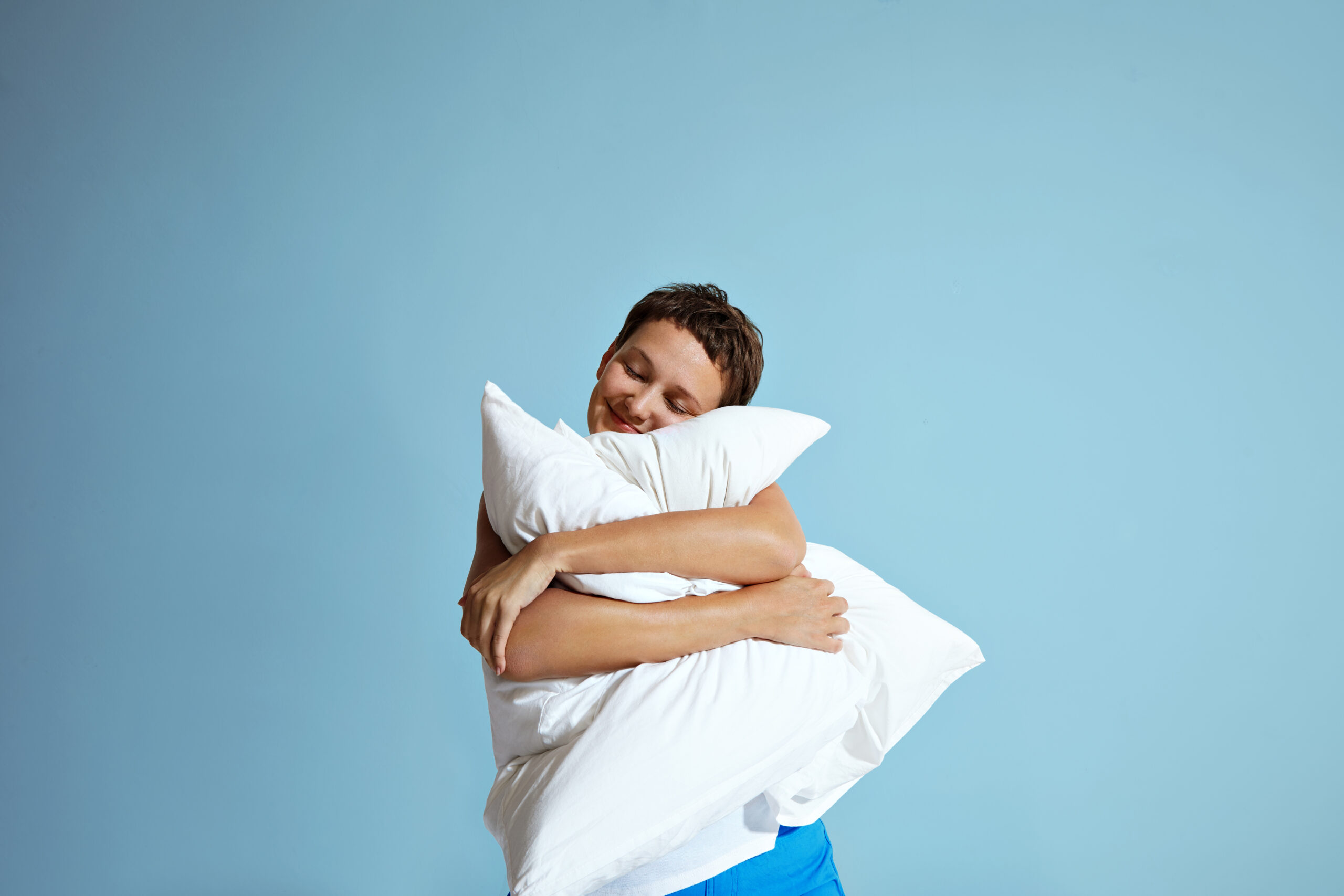Sleep is an important and often overlooked aspect of maintaining a healthy lifestyle. Many people suffer from brain fog, weight gain and mood issues without the realisation that inadequate sleep could be a contributing factor.
With 1 in 3 people in the UK suffering from insomnia, defined as the difficulty to getting to sleep or staying asleep [3], it can be difficult to know what methods can be used to improve your sleep and where to start. Research shows that 7 hours is an adequate amount of sleep for most adults, with young adults or those with medical illnesses needing 9 hours [4].
Treating insomnia can sometimes be as simple as improving sleep hygiene. Sleep hygiene refers to a set of healthy habits, behavioural and environmental factors that promote healthy sleep [5]. Simple measures such as improving your sleep environment by ensuring it is a neutral temperature and quiet can help, as well as minimising bright lights including technology. Blue lights emitted by mobile phones and televisions can inhibit melatonin production, a hormone made by the body that regulates sleep cycles. Relaxation activities such as having a bath or reading a book can also help prepare the body and mind for sleep [6].
Maintaining a healthy, balanced diet packed with nutrients and vitamins such as calcium, magnesium, vitamins A, C, D E and K can help also help regulate sleep patterns and promote better sleep [7]. Avoiding caffeine and other stimulant beverages can also lead to less disruption in sleep [8]. Exercise has also been proven to be a key factor in getting to sleep quicker, staying asleep and reducing pre-sleep anxiety [9].
Exploring other methods of improving sleep, there are a range of herbal remedies that could have properties that help overcome the symptoms of insomnia. Early studies have shown that valerian root extract could be beneficial in improving sleep and reducing the amount of waking episodes [10, 11, 12]. Furthermore, research has shown that passion flower extract can work as a sleep inducer, helping you get to sleep faster as well reducing feelings of anxiety which can lead to better quality of sleep [13, 14, 15]. A plant extract named Hops has also been shown to contain compounds that promotes sedative actions, potentially allowing for its use as an aid for sleep [16, 17]. CBD displays promising evidence for reducing anxiety, however, more clinical studies are needed[18].
Bibliography
- Watson NF, Badr MS, Belenky G, Bliwise DL, Buxton OM, Buysse D, et al. Joint Consensus Statement of the American Academy of Sleep Medicine and Sleep Research Society on the Recommended Amount of Sleep for a Healthy Adult: Methodology and Discussion. Journal of Clinical Sleep Medicine [Internet]. 2015 Aug 15;11(08).
- Worley SL. The Extraordinary Importance of Sleep: The Detrimental Effects of Inadequate Sleep on Health and Public Safety Drive an Explosion of Sleep Research. P & T : a peer-reviewed Journal for Formulary Management [Internet]. 2018 Dec;43(12):758–63.
- NHS. Insomnia causes and treatments [Internet]. Nhsinform.scot. 2019.
- Watson NF, Badr MS, Belenky G, Bliwise DL, Buxton OM, Buysse D, et al. Recommended Amount of Sleep for a Healthy Adult: A Joint Consensus Statement of the American Academy of Sleep Medicine and Sleep Research Society. Sleep [Internet]. 2015 Jun 1;38(6):843–4.
- Irish LA, Kline CE, Gunn HE, Buysse DJ, Hall MH. The role of sleep hygiene in promoting public health: A review of empirical evidence. Sleep Medicine Reviews [Internet]. 2015 Aug;22(1):23–36.
- CKS Insomnia [Internet]. NICE.
- Ikonte C, Mun J, Reider C, Grant R, Mitmesser S. Micronutrient Inadequacy in Short Sleep: Analysis of the NHANES 2005–2016. Nutrients. 2019 Oct 1;11(10):2335.
- Drake C, Roehrs T, Shambroom J, Roth T. Caffeine Effects on Sleep Taken 0, 3, or 6 Hours before Going to Bed. Journal of Clinical Sleep Medicine. 2013 Nov 15;09(11).
- Passos GS, Poyares D, Santana MG, Garbuio SA, Tufik S, Mello MT. Effect of acute physical exercise on patients with chronic primary insomnia. Journal of clinical sleep medicine: JCSM: official publication of the American Academy of Sleep Medicine [Internet]. 2010 Jun 15;6(3):270–5.
- Herrera-Arellano A, Luna-Villegas G, Cuevas-Uriostegui Ma, Alvarez L, Vargas-Pineda G, Zamilpa-Alvarez A, et al. Polysomnographic Evaluation of the Hypnotic Effect of Valeriana edulis Standardized Extract in Patients Suffering from Insomnia. Planta Medica. 2001 Nov;67(08):695–9.
- Fernández-San-Martín MI, Masa-Font R, Palacios-Soler L, Sancho-Gómez P, Calbó-Caldentey C, Flores-Mateo G. Effectiveness of Valerian on insomnia: A meta-analysis of randomized placebo-controlled trials. Sleep Medicine. 2010 Jun;11(6):505–11.
- Donath F, Quispe S, Diefenbach K, Maurer A, Fietze I, Roots I. Critical evaluation of the effect of valerian extract on sleep structure and sleep quality. Pharmacopsychiatry [Internet]. 2000 Mar 1;33(2):47–53.
- Guerrero FA, Medina GM. Effect of a medicinal plant (Passiflora incarnata L) on sleep. Sleep Science. 2017;10(3):96–100.
- Ngan A, Conduit R. A double-blind, placebo-controlled investigation of the effects of Passiflora incarnata (passionflower) herbal tea on subjective sleep quality. Phytotherapy research : PTR [Internet]. 2011;25(8):1153–9.
- Janda K, Wojtkowska K, Jakubczyk K, Antoniewicz J, Skonieczna-Żydecka K. Passiflora incarnata in Neuropsychiatric Disorders—A Systematic Review. Nutrients [Internet]. 2020 Dec 19;12(12):3894.
- Franco L, Sánchez C, Bravo R, Rodriguez A, Barriga C, Juánez J. The sedative effects of hops(Humulus lupulus), a component of beer, on the activity/rest rhythm. Acta Physiologica Hungarica. 2012 Jun;99(2):133–9.
- Min B, Ahn Y, Cho HJ, Kwak WK, Suh HJ, Jo K. GABAA Receptor-Mediated Sleep-Promoting Effect of Saaz–Saphir Hops Mixture Containing Xanthohumol and Humulone. Molecules. 2021 Nov 24;26(23):7108.

